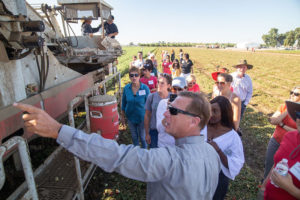Canning industry focused on drawing new customers
Canned goods don’t always have the best reputation with consumers, but many of the more common beliefs are nothing more than myths. The truth is, though, that canned goods are nutritional and convenient.
At a time when the sector is seeing significant growth due to the COVID-19 pandemic, it’s a good opportunity to clear up common misconceptions of this often harshly judged category.
Common canning misconceptions
Ginny Hair, director of the Canned Food Alliance, said the No. 1 myth consumers believe about canned goods is that fresh fruit and vegetables are more nutritious than canned. Studies show, though, that this isn’t actually the case.
Apricots, for instance, have a very short shelf life, which makes them an ideal candidate for processing. A 2018 Journal of Food Science article on the effects on the nutritional content of apricots found that canning or freezing apricots not only extends market reach, but also provides comparable or sometimes superior nutritional content compared to fresh apricots. The study found that beta-carotene, phenols and antioxidant activity are higher in canned and frozen products.
Another study that looked at the nutritional content of fresh and canned peaches found similar results. That is, the nutritional content of canned peaches was found to be comparable to that of fresh peaches.
The researchers who conducted the study measured the vitamins and phytochemicals present in canned cling peaches versus fresh freestone and found there were statistically significant, higher levels of vitamin C,
antioxidants and folate in the canned peaches. The study also found there were higher, but not statistically different, levels of vitamin A, and lower, but not statistically different, levels of vitamin E, total phenolics and total carotenoids.
Hair said this is good news for consumers. “What they found was that not only do the key nutrients hold throughout the canning or the freezing process, but due to the canning or the freezing process that some key nutrients actually increase,” she said.
Peaches are picked at the peak of freshness, and immediately shipped to nearby canning facilities where they are processed sometimes in mere hours. Preserved in a medium of ascorbic acid, sugar and water, they contain no added preservatives or artificial flavors.
But most consumers don’t know this. They believe they are eating harmful preservatives and added sugars.
“The days of high-fructose corn syrup have really diminished,” said Hair.
Another myth that concerns consumers is that canned fruit is higher in sugar than fresh. But a University of Oregon study found that while the fruit did absorb some of the medium in the early stages of canning, that medium is later released through a natural occurring process.
Consumers are also concerned about the use of BPA, an industrial chemical used to make certain plastics and resins.
“I do not know a major processor that is still using BPA,” said Hair, pointing out that processors have taken the time to look into alternative linings.
Education is key
Myth busting doesn’t happen overnight. It takes time and education, and some U.S. processors are paving the way in this department. Pacific Coast Producers, the largest private label canner of tomatoes and fruits and other processed produce, for instance, realized there was more value in having others speak up for them than spending energy defending themselves. On six separate occasions, Pacific Coast Producers has hosted what they call the Heart of California Orchard and Field Tour. Bloggers, dieticians and journalists who attend the three-day tour get an up-close view of how canned fruit and vegetables are produced and processed.
Pacific Coast Producers vice president of sales and marketing Andy Russick said first-time attendees are hesitant, but open-minded to the experience.
“Once we take them around and introduce them to our farming community, and all of our great staff, our plant managers and our quality assurance people, we always win them over,” he said. “We always gain friends.”

Through the tour, Pacific Coast Producers has connected with 84 influencers with a reach of 20 million impressions.
“What I’ve always known is that in the absence of real information, people tend to fill it negatively, they tend to think the worst,” said Russick. “We’ve now got people wanting to fill it positively.”
Tour attendees are always impressed by the company’s waste reduction strategies. Pacific Coast Producers has found uses for everything from tomato skin to sliced scraps to peach and apricot pits.
The COVID crisis drove interest in canned food as well. Consumers who wanted to reduce the number of grocery trips they made each week rediscovered the canned food aisle. Hotel and food service providers who needed to be more flexible in uncertain times in order to reduce food waste also turned to non-perishable food items. Sales of Pacific Coast Producers products surged; in a seven-week period they sold more than they normally sell in a 26-week period. Much of that growth can be attributed to the rise in e-commerce as well, as canned goods ship well.
In his 34 years in the business, Russick said much of the focus has been on customer retention, not growth. Now they’re shifting gears and looking for new ways to keep newfound customers interested. They’ve launched a new tri-colored tomato product in olive oil that’s sold in a beautifully embossed can, as well as peach coulis suitable as a healthy breakfast or dessert topping.
Russick is clearly excited about canned food’s comeback.
“I never thought canned fruit would be an item that someone would put on their list. I just didn’t think we would be that cool,” he said. “But, yeah, we’re on people’s lists, so that’s pretty neat stuff.”
Photo at top: Heart of California Orchard & Field Tour attendees check out freshly harvested California Cling peaches at Pacific Coast Producer’s plant in Oroville, California, before they are canned







